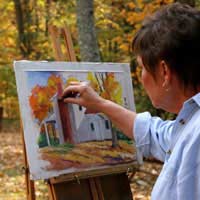Understanding Landscape

The landscape drawing or painting is a picture conceived with the intention of conveying a particular natural scene: for example a mountain as with the 'impressionist' painter Paul Cézanne’s famous Mounte Saint Victoire of 1885.
It was Cézanne’s intention to evoke a realistic depiction of the landscape by creating in paint the 'impressions' that nature created in the eye and mind of the viewer. Painters of landscape that had followed before Cézanne had tried to accurately depict the landscape by creating the impression of 'perspective'.
Perspective is a system of drawing and/or painting devised in Renaissance Italy in order to accurately represent space and distance through the mapping out of different areas of the canvas geometrically, so that they would meet the eye-line in the same way that a real landscape would. Essentially this involves ensuring that bigger objects in the foreground are presented larger than those depicted further away. A good example of Renaissance perspective can be seen in Piero della Francesca's 'The Baptism of Christ' (1450).
Other attempts have been made to represent the landscape as it 'feels' emotionally to the painter (such as in Edvard Munch's 'The Scream', 1893), as it appears in the human dream consciousness (such as with the dreamscapes of surrealist Salvador Dali) and as it appears in a photograph, as with the Photorealist work of Gerhard Richter.
In all these attempts the intention of the landscape painter has been to try and gain a better understanding of natural phenomena through a depiction of the landscape. How this is achieved changes over time and is dependent on the society that the artist lived in.
The Effects of Scientific Change on Landscape Pictures
Landscape pictures have generally changed in line with changing scientific and philosophical attitudes. The Renaissance period came at a time of deep questioning: Man sought to understand nature so that he could better know the mind of God.Later changes accorded with a loss of faith in God and a focus on the passions of mankind. This sentiment was evoked in painting by artists such a J.M.W Turner, who's 'Rain, Steam and Speed', 1844, showed the power of man in the steam train age, over the surrounding landscape.
Impressionism drew upon this sentiment, building upon advances made in the understanding of how light and colour impacted upon the human mind: Paintings were conceived as a sequence of colour and light investigations, which favoured not an intelligent heavenly creator, but a system of scientifically calculated brain and eye responses to objects, that themselves created the vision we see.
Later, new understandings of the human subconscious placed primary emphasis on the imaginative power of the human mind in creating landscapes: Those visions evoked in dreams and those emotions felt in the face of great landscapes were, for Surrealists and Expressionists, as real as any artistic attempts at depicting reality dreamt up by mathematical and scientific enquiry.


Re: Contextualising Your Work
Dear Mr Watson, I have been working relentlessly for 40 years through Art, writing, performance based expressions in theatre, dance,…
Re: How to Sell My Paintings and Drawings?
Hi , I would like say about my cousin that he live in Afghanistan and he is fabulous in art painting and doing job…
Re: How to Sell My Paintings and Drawings?
Amy - Your Question:Hi I have just left school and I love to draw I do pencil work and I would love to sell my…
Re: How to Sell My Paintings and Drawings?
Hi I have just left school and I love to draw I do pencil work and I would love to sell my drawing but I don't no how…
Re: How to Sell My Paintings and Drawings?
Hi, I have 3 drawings the information as follows: 1- Salvador Dali (Spanish Draftsman). Is 24x19 cm. 2- Pablo…
Re: Freeing Yourself Up
I love drawing so much and I will like to be one of the best artist in the world
Re: How to Sell My Paintings and Drawings?
anna-81 - Your Question:Hi, I need help how can I sale my paintings and drawings and I want to know if my work is…
Re: How to Sell My Paintings and Drawings?
Hi, i need help how can i sale my paintings and drawings and i want to know if my work is really good or not. I'm…
Re: How to Sell My Paintings and Drawings?
i want to sell my drawing give me the idea.
Re: How to Sell My Paintings and Drawings?
I am 15 years old and i would like to sell my pencil drawing